Macromolecules review - Study guides, Class notes & Summaries
Looking for the best study guides, study notes and summaries about Macromolecules review? On this page you'll find 346 study documents about Macromolecules review.
Page 3 out of 346 results
Sort by
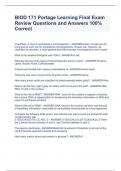
-
BIOD 171 Portage Learning Final Exam Review Questions and Answers 100% Correct
- Exam (elaborations) • 14 pages • 2023
- Available in package deal
-
- $11.49
- + learn more
BIOD 171 Portage Learning Final Exam Review Questions and Answers 100% CorrectBIOD 171 Portage Learning Final Exam Review Questions and Answers 100% CorrectBIOD 171 Portage Learning Final Exam Review Questions and Answers 100% Correct True/False. A virus is considered a microorganism. - ANSWER-False, Viruses are not living and as such are not considered microorganisms. Viruses can, however, be classified as microbes, a more general term that includes microorganisms and viruses. What is the s...
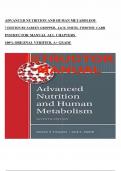
-
Instructor Manual for Advanced Nutrition and Human Metabolism 7th Edition By Sareen Gropper, Jack Smith, Timothy Carr (All Chapters, 100% Verified) A+ Grade
- Other • 160 pages • 2024
-
- $19.64
- + learn more
Instructor Manual for Advanced Nutrition and Human Metabolism 7th Edition By Sareen Gropper, Jack Smith, Timothy Carr (All Chapters, 100% Verified) A+ Grade-Table of Contents • Chapter Outline • Resources • Perspectives – Classroom Discussion • Assignment – Group Project • Answer Keys o Case Study o Responding to Research o Labeling It • Worksheet 1: Responding to Research – Mitochondria and Aging • Worksheet 2: Labeling It – A Eukaryotic Cell Chapter Outline ...

-
BIOD 171 / BIOD171 Portage Learning Final Exam Review Latest 2023 - 2024 Essential Microbiology Final Exam Portage Learning
- Exam (elaborations) • 31 pages • 2023
- Available in package deal
-
- $17.99
- + learn more
BIOD 171 / BIOD171 Portage Learning Final Exam Review Latest Essential Microbiology Final Exam Portage Learning True/False. A virus is considered a microorganism. - CORRECT ANSWER-False, Viruses are not living and as such are not considered microorganisms. Viruses can, however, be classified as microbes, a more general term that includes microorganisms and viruses. What is the smallest biological unit of life? - CORRECT ANSWER-A cell What are the four main types of macromolecules fou...

-
BACE Exam Review (2023/2024) Already Graded A
- Exam (elaborations) • 20 pages • 2023
- Available in package deal
-
- $9.99
- + learn more
BACE Exam Review (2023/2024) Already Graded A bioethics applying moral values to decision-making on topics brought up by advances in biology, medicine, and technology biotechnology the study and manipulation of living things or their components data information gathered during an experiment genome an entire set of an organism's genetic information hypothesis a testable prediction to a scientific question journal a scientific magazine or periodical where scientists publish their experiments...
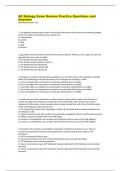
-
AP Biology Exam Review Practice Questions and Answers
- Exam (elaborations) • 42 pages • 2024
- Available in package deal
-
- $14.69
- + learn more
AP Biology Exam Review Practice Questions and Answers DNA/Biochemestry Test -- 1. The digestive enzyme pepsin works in the acidic environment of the stomach to hydrolyze peptide bonds. On which macromolecules does pepsin act? A. carbohydrate B. protein C. DNA D. lipid B. Protein 2. Egg whites consist primarily of water and the protein albumin. When you fry an egg, why does the egg white turn from clear to white? A. The protein becomes dissociated. B. The protein acquires terti...
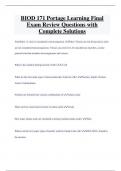
-
BIOD 171 Portage Learning Final Exam Review Questions with Complete Solutions
- Exam (elaborations) • 26 pages • 2024
- Available in package deal
-
- $13.99
- + learn more
BIOD 171 Portage Learning Final Exam Review Questions with Complete Solutions True/False. A virus is considered a microorganism. False, Viruses are not living and as such are not considered microorganisms. Viruses can, however, be classified as microbes, a more general term that includes microorganisms and viruses. What is the smallest biological unit of life? A cell What are the four main types of macromolecules found in cells? Proteins, Lipids, Nucleic Acids, Carbohydrates Protei...
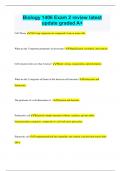
-
Biology 1406 Exam 2 review latest update graded A+
- Exam (elaborations) • 15 pages • 2024
- Available in package deal
-
- $9.99
- + learn more
Biology 1406 Exam 2 review latest update graded A+ Cell Theory All living organisms are composed of one or more cells. What are the 3 important parameters in microsopy? Magnification, resoultion, and contrast. Cell structure relies on what 4 factors? Matter, energy, organization, and information What are the 2 categories all forms of life based on cell structure? Prokaryotes and Eukaryotes. The proetome of a cell determines its ? Structure and function. Prokaryotic cell Rel...
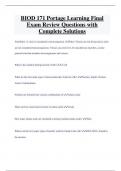
-
BIOD 171 Portage Learning Final Exam Review Questions with Complete Solutions
- Exam (elaborations) • 26 pages • 2024
- Available in package deal
-
- $12.49
- + learn more
BIOD 171 Portage Learning Final Exam Review Questions with Complete Solutions True/False. A virus is considered a microorganism. False, Viruses are not living and as such are not considered microorganisms. Viruses can, however, be classified as microbes, a more general term that includes microorganisms and viruses. What is the smallest biological unit of life? A cell What are the four main types of macromolecules found in cells? Proteins, Lipids, Nucleic Acids, Carbohydrates Protei...
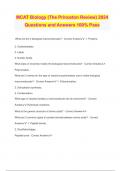
-
MCAT Biology (The Princeton Review) 2024 Questions and Answers 100% Pass
- Exam (elaborations) • 191 pages • 2024
-
- $13.49
- + learn more
MCAT Biology (The Princeton Review) 2024 Questions and Answers 100% Pass What are the 4 biological macromolecules? - Correct Answer️️ -1. Proteins. 2. Carbohydrates. 3. Lipids. 4. Nucleic Acids. What class of enzymes makes the biological macromolecules? - Correct Answer️️ - Polymerases. What are 3 names for the type of reactions polymerases use to make biological macromolecules? - Correct Answer️️ -1. Polymerization. 2. Dehydration synthesis. 3. Condensation. What type of...
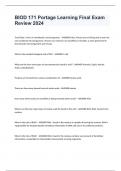
-
BIOD 171 Portage Learning Final Exam Review 2024
- Exam (elaborations) • 25 pages • 2024
- Available in package deal
-
- $12.99
- + learn more
BIOD 171 Portage Learning Final Exam Review 2024 What are the four main types of macromolecules found in cells? Proteins, Lipids, Nucleic Acids, Carbohydrates Proteins are formed from various combinations of Amino acids There are how many known forms of amino acids twenty

How did he do that? By selling his study resources on Stuvia. Try it yourself! Discover all about earning on Stuvia


